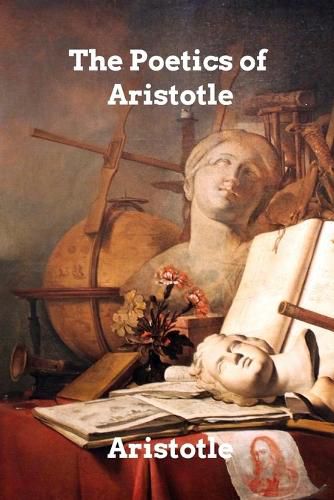Readings Newsletter
Become a Readings Member to make your shopping experience even easier.
Sign in or sign up for free!
You’re not far away from qualifying for FREE standard shipping within Australia
You’ve qualified for FREE standard shipping within Australia
The cart is loading…






This title is printed to order. This book may have been self-published. If so, we cannot guarantee the quality of the content. In the main most books will have gone through the editing process however some may not. We therefore suggest that you be aware of this before ordering this book. If in doubt check either the author or publisher’s details as we are unable to accept any returns unless they are faulty. Please contact us if you have any questions.
Aristotle's Poetics (c. 335 BC) is the earliest surviving work of Greek dramatic theory and first extant philosophical treatise to focus on literary theory. In this text Aristotle offers an account of ????????, which refers to poetry and more literally "the poetic art," deriving from the term for "poet; author; maker," ???????. Aristotle divides the art of poetry into verse drama (to include comedy, tragedy, and the satyr play), lyric poetry, and epic. The genres all share the function of mimesis, or imitation of life, but differ in three ways that Aristotle describes: Differences in music rhythm, harmony, meter and melody. Difference of goodness in the characters. Difference in how the narrative is presented: telling a story or acting it out. Aristotle's work on aesthetics consists of the Poetics, Politics (Bk VIII) and Rhetoric. The Poetics was lost to the Western world for a long time. The text was restored to the West in the Middle Ages and early Renaissance only through a Latin translation of an Arabic version written by Averroes. The accurate Greek-Latin translation made by William of Moerbeke in 1278 was virtually ignored. At some point during antiquity, the original text of the Poetics was divided in two, each "book" written on a separate roll of papyrus. Only the first part - that which focuses on tragedy and epic (as a quasi-dramatic art, given its definition in Ch 23) - survives. The lost second part addressed comedy. Some scholars speculate that the Tractatus coislinianus summarises the contents of the lost second book
$9.00 standard shipping within Australia
FREE standard shipping within Australia for orders over $100.00
Express & International shipping calculated at checkout
This title is printed to order. This book may have been self-published. If so, we cannot guarantee the quality of the content. In the main most books will have gone through the editing process however some may not. We therefore suggest that you be aware of this before ordering this book. If in doubt check either the author or publisher’s details as we are unable to accept any returns unless they are faulty. Please contact us if you have any questions.
Aristotle's Poetics (c. 335 BC) is the earliest surviving work of Greek dramatic theory and first extant philosophical treatise to focus on literary theory. In this text Aristotle offers an account of ????????, which refers to poetry and more literally "the poetic art," deriving from the term for "poet; author; maker," ???????. Aristotle divides the art of poetry into verse drama (to include comedy, tragedy, and the satyr play), lyric poetry, and epic. The genres all share the function of mimesis, or imitation of life, but differ in three ways that Aristotle describes: Differences in music rhythm, harmony, meter and melody. Difference of goodness in the characters. Difference in how the narrative is presented: telling a story or acting it out. Aristotle's work on aesthetics consists of the Poetics, Politics (Bk VIII) and Rhetoric. The Poetics was lost to the Western world for a long time. The text was restored to the West in the Middle Ages and early Renaissance only through a Latin translation of an Arabic version written by Averroes. The accurate Greek-Latin translation made by William of Moerbeke in 1278 was virtually ignored. At some point during antiquity, the original text of the Poetics was divided in two, each "book" written on a separate roll of papyrus. Only the first part - that which focuses on tragedy and epic (as a quasi-dramatic art, given its definition in Ch 23) - survives. The lost second part addressed comedy. Some scholars speculate that the Tractatus coislinianus summarises the contents of the lost second book